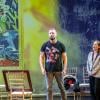
San Francisco Performances opened its 45th season with a gala song recital by tenor Nicholas Phan and pianist and composer Jake Heggie. This Oct. 4 performance in Herbst Theatre was a celebratory, warm, and intimate occasion, as though you were in someone’s living room among a small group of good friends.
Spoken program notes helped set the mood, with Phan and occasionally Heggie introducing some of the songs. Phan gently mocked himself with the old joke about what tenors have in their heads (spoiler: nothing). But it was the performers’ artistic approach that truly created the intimacy. Phan can color his voice endlessly, and while there’s power when he wants it, he’s far more likely to lure you in with a thousand degrees of soft singing. Heggie’s pianism is discreet and understated, far more supportive than attention-getting.
Their program consisted of 18 well-chosen songs — mostly in English, though with brief detours into German, French, and Czech — all on the theme of the power of music. The first selection was also the earliest chronologically: Henry Purcell’s “If Music Be the Food of Love” (in Benjamin Britten’s arrangement), a setting of a poem by Henry Heveningham that takes off from the opening lines of Shakespeare’s Twelfth Night. Phan executed Purcell’s florid melodies fluidly and with sly flirtation.

In his spoken remarks, the tenor said that the recital’s second section was about families and music — perhaps in a nostalgic, idealized sense, for none of the songs had even a hint of the storminess and conflict that can afflict families.
Ives’s “The Things Our Fathers Loved” looks back on small-town America, the local square, the village band, and the songs that sing in one’s soul, all common themes for the composer. The first song in Ives’s Memories, “Very Pleasant,” jauntily details a visit to an opera house and what you hear, see, and feel while waiting for the curtain to rise. Heggie had to multitask here, whistling while playing the piano. “Very Pleasant” is such a charmer, and the pair executed it with such enthusiasm, that it left me wishing humorous songs were included on more recitals.
Phan’s light touch served him well in those numbers and especially in Felix Mendelssohn’s “Auf Flügeln des Gesanges” (On wings of song), its rippling, flowing accompaniment mimicking the Ganges River, near which two lovers lie in a field under the moon.
Before he wrote his first opera, Heggie was already known as a superb composer of art songs. “Silence” from Newer Every Day, his song cycle on poems of Emily Dickinson, was a forceful reminder of this, and Phan drew out its gorgeous melody in a perfectly arched line.
“Silence” was coupled with Ralph Vaughan Williams’s “Silent Noon,” after a poem by Dante Gabriel Rossetti. It’s a remarkable song, with unexpected modulations and a splendid setting of the text. Ives, Heggie, and Vaughan Williams all offer object lessons in how to set English clearly and naturally, which any number of opera librettists and composers could learn from.
Next were three serenades, two of them in German (and both titled “Ständchen”). One was Brahms’s cheery setting of a poem by Franz Kugler, and another was Schubert’s yearning setting, from his collection Schwanengesang, of a poem by Ludwig Rellstab. Phan sang the first four verses of the latter lightly, his voice a delicate shadow, and then closed in full voice, asking the object of the poem’s love to come to him. Gabriel Fauré’s “Mandoline,” setting a poem by Paul Verlaine, would have benefited from purer French.
Heggie’s song cycle Friendly Persuasions, written for a festival dedicated to Francis Poulenc, took up the penultimate section of the program. These four charming songs, to texts by librettist Gene Scheer, portray four friends who profoundly impacted the life of the French composer: the harpsichordist Wanda Landowska; the baritone Pierre Bernac, a great recitalist for whom Poulenc wrote some 90 songs; Raymonde Linossier, a friend who died too young; and the poet Paul Éluard. These songs neatly reflect the people they portray: “Landowska” has a touch of Bach, and “Bernac” tips its hat to Poulenc’s style. The sorrowful, hushed “Linossier” led directly to the stormy World War II setting of “Éluard.”
The end of the recital paid homage to the sheer joy of singing, starting with Leonard Bernstein’s “I Hate Music!” with an amusing text by the composer himself. Florence Price’s “The Poet and His Song,” to a poem by Paul Laurence Dunbar, moves from straightforward accompaniment to more complex harmonies. The set closed with “What Shall I Sing?” words and music by Errollyn Wallen, who was recently named Master of the King’s Music by Charles III. Her song sets a free-form text to a sometimes jazzy, sometimes bluesy accompaniment.
If you’re wondering why Schubert’s “An die Musik,” perhaps the most famous song of its type, wasn’t on the program, of course it was the encore.
Phan and Heggie’s recital lasted just an hour, yet it was as substantial and satisfying as many much longer programs thanks to the variety of songs and the intelligence and beauty of the performances.




